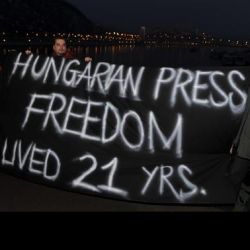In opinion of the Helsinki Foundation for Human Rights this Act is a sign of regression in the range of democratic transformation in Hungary. By this manner the Helsinki Foundation for Human Rights appealed to the Prime Minister Donald Tusk to take actions meant to control the European Commission actions in the range of clarification of the provision of this Act.
The Helsinki Foundation for Human Rights appealed also to the President of the European Parliament Jerzy Buzek and the forty nine Polish MEPs to initiate the control over the activities of the European Comission regarding the new media law in Hungary.
The Hungarian Media Act establishes the new National Media and Communications Authority (NMHH) that supervises all Hungarian electronic media. The art. 111(3) sets forth that the head of this body will be appointed by the Prime Minister for a term of nine years, while the article 113(1c) and (1d) create the possibility of dismissal by the President or by the Prime Minister. However, the grounds for the dismissal are formulated in a laconic manner. The procedure of appointing and dismissing the President of the Authority also raises doubts as to its political independence.
Another provision that gives rise to concern of the Helsinki Foundation for Human Rights is the establishment of the Media Council whose members are appointed by the Parliament for a term of nine years (art. 124 p. 1 of the Act). The Chairman of the Media Council is appointed by the Prime Minister. The articles 185-187 give the power to impose fines on broadcasters, especially for presenting content of a “drastic and brutal character that violates the personal dignity and incites hatred between nations and religions.” However, the terms are imprecise and therefore leave to the Council a broad margin for action. Moreover, the provisions allow imposing fines on media for broadcasting content that goes against the correct and accepted political line designated by the government. The fines imposed by the Council may be up to 200m HUF (700 000 EUR) in the case of the electronic media and 25m HUF (89000 EUR) in the case of newspapers and internet publications. Such fines, when imposed, may result in a bankruptcy of smaller broadcasters and editors.
In opinion of the Helsinki Foundation for Human Rights the adoption of such a law in a state which is a member of international organizations protecting human rights such as the European Union, the Council of Europe as well as the Organization for Security and Cooperation in Europe, should raise immediate objections of these organizations as well as the remaining member states.
A several days after this appeal the Secretary of the State for European affairs and economic policy, Mikołaj Dowgielewicz in the interview for the online newspaper EUobserver expressed his opinion regarding the new Hungarian media law. Mikołaj Dowgielewicz stated, that “The Polish government has watched with discomfort as older EU members, such as France and Germany, and their top newspapers have in recent weeks mangled the Hungarian EU presidency over its alleged attack on free press in a new law.”1. In the appeal to the Mikołaj Dowgielewicz Helsinki Foundation for Human Rights expressed its concern about his opinion.
The Helsinki Foundation for Human Rights stated that in the light of Poland’s aspirations towards being a serious partner on the EU level and in central Europe it is crucial to adopt active position and support the European Commission in its negotiations with Hungarian government that concern the amendment or repeal of the law. Silence on the part of the government moreover undermines Poland’s legitimacy to support democracy and human rights in the states of the Eastern Partnership.
One more time, the Helsinki Foundation for Human Rights called the government to adopt an active position by officially condemning the Hungarian media law and supporting the actions of the EU institutions in this area.
*Zuzanna Warso and Dominika Gmerek – the volounteers of the Helsinki Foundation for Human Rights





